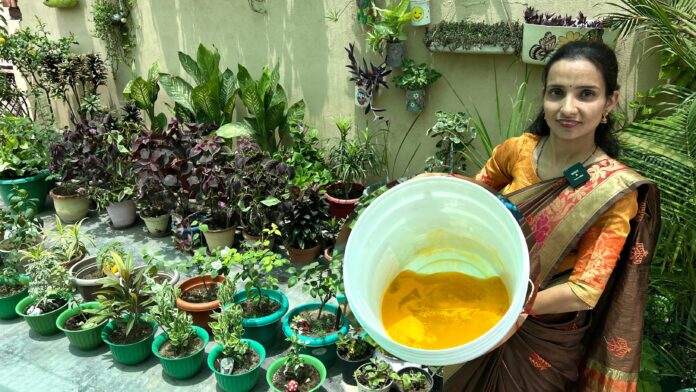In the present times, when sustainability is more crucial than ever, preparing organic fertilizers on you own at home is a mighty way to considerably contribute towards building and maintaining a healthier environment. Not only does it considerably reduce waste, but, also at the same time, it provides your plants with the essential rich nutrients, promoting an overall healthy growth without the use of chemicals. Here are five simple & most effective ways to prepare organic fertilizers at home.
- Composting Different Daily Scraps from Kitchen
Composting is considered to be one of the easiest, straightforward as well as effective ways to create high-quality organic fertilizer right at your home. By collecting various kitchen scraps like vegetable leftovers, fruit peels, coffee grounds, and eggshells, you can manage to create a nutrient-rich compost that will strongly benefit your garden eventually.
Process to Compost: You will have to start by setting up a fair-sized compost bin in your backyard or even a small container indoors. Then keep adding your kitchen scraps along with the yard waste like grass clippings, leaves, & small branches. You have to keep turning the compost regularly to aerate it and speed up the process of decomposition. Within a few months, you’ll find dark, crumbly compost which is prepared and fully ready to nourish your plants.
- Using Clippings of Grass
The clippings of grass are a fantastic and rich source of nitrogen. Nitrogen is a key nutrient for the plants’ growth Rather than throwing away your clippings of grass after mowing the lawn, you may use them to create a natural fertilizer.
How to Use Grass Clippings? You can spread fresh grass clippings directly around your plants as a mulch. As they start decomposing, they will release nutrients into the soil. Alternatively, you can let the clippings dry out and then add them to your compost pile to enhance its content of nitrogen.
- Banana Peels Turned into Fertilizer
Banana peels are rich in potassium, phosphorus, & calcium, all of which are essential for plant health. Instead of discarding banana peels, use them to strongly boost your garden’s nutrient levels.
How to Use Banana Peels? You can bury some banana peels directly into the soil near the roots of your plants. Another effective method is to soak the banana peels in water for a few days to create a potassium-rich liquid fertilizer. Use this particular liquid to water your plants, giving them an instant nutrient boost.
- Eggshell Fertilizer
Eggshells happens to be an excellent source of calcium, which considerably helps in strengthening the cell walls of several plants. This is specifically beneficial for preventing the blossom-end rot in peppers and tomatoes.
How to Use Eggshells? Crush the eggshells into very small pieces & then sprinkle them around your plants or mix them into the soil. You can also consider grinding the eggshells into a fine powder & add it directly to your compost pile to boost its content of calcium.
- Coffee Grounds for Acid-Loving Plants
Coffee grounds are highly rich in nitrogen and have a slightly acidic pH, making them very ideal for acid-loving plants like blueberries, roses, and tomatoes.
How to Use Coffee Grounds? You can simply opt to sprinkle used coffee grounds around the base of your plants or add them to your compost pile. You need to be very cautious not to overdo it, as too much acidity can likely harm some plants. Coffee grounds also help considerably in improving the soil structure by adding some organic matter, which likely increases soil aeration and drainage.
Conclusion
Preparing organic fertilizers at home is not only easy but also highly rewarding. By recycling the kitchen scraps and yard waste, you can create nutrient-rich fertilizers that will keep your garden highly thriving and flourishing while at the same time, reducing your environmental footprint to a large extent. Whether you are an experienced gardener or just starting out, the above five methods will help you grow much healthier, more resilient plants without even relying on several kinds of synthetic fertilizers available in the market. You can ideally start today, and watch your garden thrive in front of your eyes in no time!



